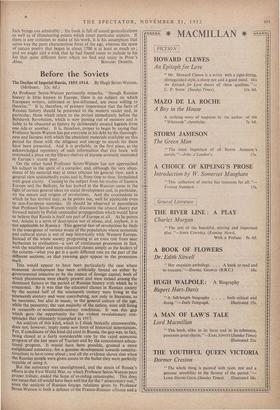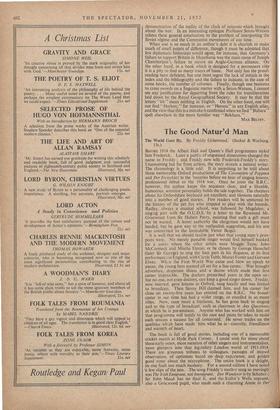Before the Soviets
The Decline of Imperial Russia, 1855-1914. By Hugh Seton-Watson. (Methuen. 32s. 6d.) As Professor Seton-Watson pertinently remarks, "though Russian history is little known it Europe, there is no subject on which European writers, informed or less-informed, are more willing to theorise." It is, therefore, of primary importance that the facts of Russian history should be presented to the western reader and, in particular, those which relate to the period immediately before the Bolshevik Revolution, which is now passing out of memory and is liable to be obscured• as history by deliberately created legends from one side or another. It is, therefore, proper to begin by saying that Professor Seton-Watson has put everyone in his debt by the thorough- ness and fairness with which the abundant materials available on this period for those with the diligence and energy to search for• them have been presented. And it is probably, in the first place, as the acknowledged repository of such information that this book will command a place on the library-shelves of anyone seriously interested in Europe's recent past.
On the other hand. Professor Seton-Watson has not approached his subject in the spirit of a compiler, and, although the very abun- dance of his material may at times obscure his general view, such a general view undoubtedly exists and is, from time to time, formulated with great clarity. Coming to the subject from his studies of Eastern Europe and the Balkans, he has looked at the Russian scene in the light of certain general ideas on social development and, in particular, on the nature and origins of revolutions. And the conclusions to which lie has arrived may, as he points out, well be applicable even to non-European societies. (It should be observed in parenthesis that Professor Seton-Watson totally discounts the absurd theory put forward mainly by Polish nationalist propagandists which would have us believe that Russia is itself not part of Europe at all. As he points out, Asiatic is a term of description not of abuse, and, anyhow, it is not applicable to Russia.) -This general law of revolutions he finds in the emergence of various strata of the population whose economic and cultural status is out of step historically with Western Europe. Instead of the whole society progressing at an even rate from near barbarism to civilisation—•a sort of continuous procession -in fact, with the wealthier and more educated classes simply as the leaders of the column—what you get is a quite different rate on the part of the different sections, so that yawning gaps appear in the procession itself.
This would appear to have been particularly the case where economic development has been artificially forced on either by governmental initiative or by the impact of foreign capital, both of which phenomena were clearly present and were indeed among the dominant factors in the period of Russian history with which he is concerned. So it was that the educated classes in Russian society by the second half of the nineteenth century were living in the nineteenth century and were contributing, not only in -literature, as he mentions, but also in music, to the general culture of the age, while the peasantry, the vast majority of the nation, were still living in sixteenth- or seventeenth-century conditions. It was this gap which gave the opportunity for the violent revolutionary con- spiracies that ultimately triumphed in 1917.
An analysis of this kind, which is I think basically unanswerable, does not, however, imply some new form of historical determinism. For, if conditions of this kind did exist in Russia, the gap was, in fact, being closed at a fairly considerable rate by the rapid economic Progress of the last years of Tsarism and by the concomitant educa- tional progress. It would have been possible, granted a more enlightened autocracy, for a genuine development towards constitu- tionalism to have come about ; and all the evidence shows that when the Russian people were given-access to the ballot they were perfectly capable of using it.
But the autocracy was unenlightened, and the strain of Russia's efforts in the First World War, to which Professor Seton-Watson pays Proper tribute, ended the hope of avoiding catastrophe. This, does not mean that all would have been well but for the " unnecessary war," since the analysis of Russian foreign relations given by Professor ‘Seton-Watson is both a defence of the Franco-Russian alliance and a demonstration of the reality of the clash of interests which brought about the war. In an interesting epilogue Professor Seton-Watson relates these general conclusions to the problem of interpreting the Soviet regime and the Communist movements of our time.
When one is so much in an author's debt it is• churlish to make much of small poipts of difference, though it must be admitted that few diplomatic historians would agree, for instance, that Germany's failure to support Britain in Manchuria was the main cause of Joseph Chamberlain's failure to secure an Anglo-German alliance. On the other hand, in a book which is designed for a permanent role it is a pity to find so many traces of haste. Not only has the proof- reading been deficient, but one must regret the lack of initials in the index and the bibliography and the failure to indicate, in the case of some books, the number of volumes. Finally, though one hesitates to cross swords on a linguistic matter with a Seton-Watson, I cannot see any justification for departing from the rules for transliteration laid down by the Royal Geographical Society. It may be that the letters "kh" mean nothing in English. On the other hand, one will not find "Harkov," for instance, or "Herson" in any English atlas, and the view that this is a mistake is confirmed when we find "Buhara" spelt elsewhere in the more familiar way "Bokhara."
MAX BELOFF.











































































 Previous page
Previous page